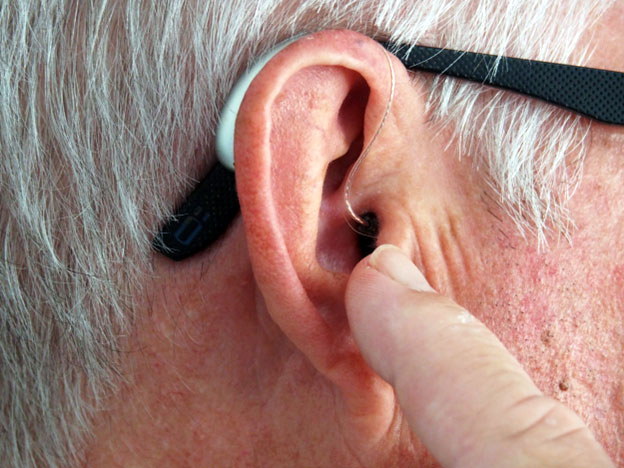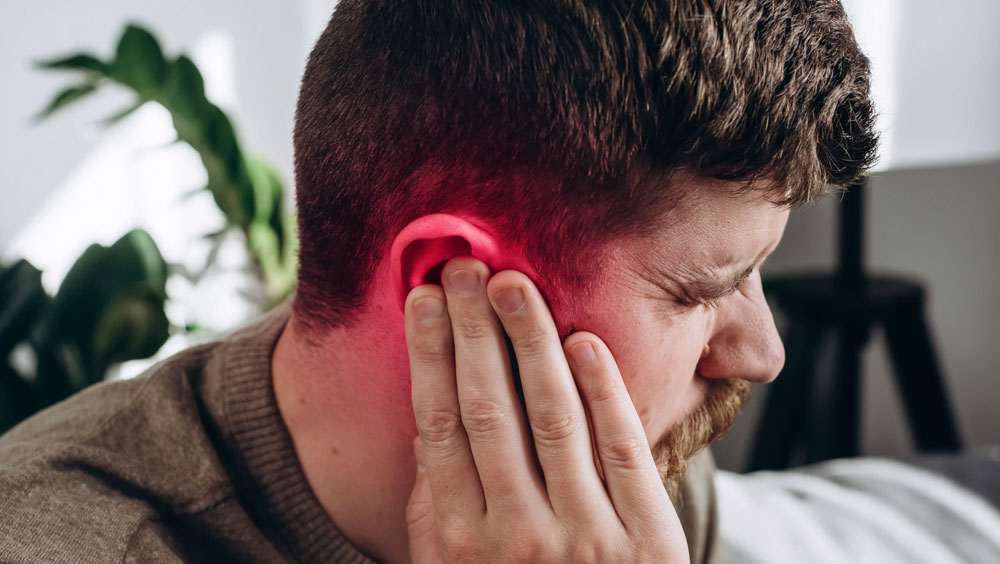Ear infections can be incredibly uncomfortable and painful. It's important to get treatment for your ear infection in order to reduce your symptoms. However, if you’ve been diagnosed with an ear infection, there are several home remedies you can try to help ease the pain and reduce inflammation.

Identifying Ear Infections and Their Symptoms
One common type of ear infection is a middle ear infection, also known as otitis media. Symptoms may include ear pain, drainage of fluid from the ear, hearing loss, and fever. Children, in particular, may experience irritability, trouble sleeping, and tugging or pulling at the affected ear.
Outer ear infections, also known as otitis externa or swimmer's ear, typically display symptoms such as pain when touching or pulling the outside of the ear, redness or swelling of the ear canal, and drainage. Itching or discomfort in the ear, difficulty hearing, and a sensation of fullness or plugged ears may also occur.
An accurate diagnosis is crucial as ear infections can be caused by both viral and bacterial infections, and appropriate treatment depends on the underlying cause. Failure to seek proper medical care can lead to complications such as hearing loss or worsening infection.
Home Remedies for Ear Infections
In addition to seeking medical attention, there are several home remedies that can provide temporary relief and aid in the healing process for ear infections. Here are some recommendations on how to treat ear infection at home:
Warm Compress: Apply a warm compress to the affected area to soothe ear pain and also help reduce inflammation. Simply soak a washcloth in warm water, rid it of the excess water, and place it against the ear. The warmth can provide comfort and promote relaxation.
Garlic Oil Drops: Garlic has natural antimicrobial and pain-relieving properties. You can make garlic oil drops by crushing a clove of garlic and mixing it with a carrier oil like olive oil. After letting it sit for a few hours, strain the mixture and use a couple of drops in the infected ear. It is important to note that you should never put garlic oil directly into the ear canal or use it if there is a ruptured eardrum.
Saltwater Rinse: A saltwater solution can be beneficial for cleansing the ear and aiding in the healing process. Mix half a teaspoon of salt in a cup of warm water and use a sterile dropper to place a few drops in the affected ear. Gently tilt your head to allow the solution to reach the ear canal, and then drain it out.
Onion Poultice: An onion poultice applied externally can help reduce inflammation and ease discomfort. To make a poultice, grate or finely chop an onion and place it in a clean cloth or gauze. Fold the cloth and apply it to the affected ear for about 15 minutes. Be sure to clean the area thoroughly afterward.
Herbal Ear Drops: Certain herbal extracts, such as chamomile or tea tree oil, have antiseptic properties that may help fight infection. Dilute a few drops of the chosen herbal extract in warm water and use a sterile dropper to administer a couple of drops into the infected ear.

Pain Relievers: Over-the-counter medicines can be used to manage pain and fever (if appropriate). Nonsteroidal anti-inflammatory drugs (NSAIDs) such as ibuprofen or acetaminophen can help alleviate the symptoms. Be sure to adhere to the recommended dosage instructions.
Rest and Hydration: Rest is crucial for a speedy recovery. Make sure to drink plenty of fluids to stay hydrated and support your body's immune system.
Precautions and When to Seek Medical Attention
While there are various home remedies that can provide temporary relief for ear infections, it is important to exercise caution and consider the following precautions:
Consultation with a Healthcare Professional: It is crucial to consult a healthcare professional before attempting any home remedies, especially for children and in cases of severe pain or recurrent infections.
Ruptured Eardrum: Never use garlic oil drops or any other solution directly into the ear canal if there is a ruptured eardrum. This can potentially worsen the infection and cause further complications.
Allergic Reactions: Some individuals may have allergies to certain herbal extracts, such as chamomile or tea tree oil. It is advisable to perform a patch test before using herbal ear drops to check for any adverse reactions.
Follow Dosage Instructions: When using over-the-counter pain relievers, it is important to follow the recommended dosage instructions. Overdosing can lead to unwanted side effects and may be harmful to your health.
When to Seek Medical Attention:
Seek medical care if you or your child experience any of the following:
Severe Pain: If the pain becomes severe and unbearable, it is important to seek medical attention to manage the pain effectively.

High Fever: A high fever, particularly in infants and young children, may indicate a more serious infection and should be evaluated by a healthcare professional.
Hearing Loss: If there is a noticeable decrease in hearing or if hearing loss accompanies the ear infection, it is important to consult a healthcare professional for proper evaluation and treatment.
Recurrent or Persistent Infections: If ear infections frequently occur or if the infection does not improve with home remedies within a few days, medical attention is necessary to determine if further treatment is required.
Preventive Measures
Dry Ears Properly: Moisture can create a breeding ground for bacteria, leading to infections. After a bath or swimming, pat dry your ears with a towel or use a hairdryer on a low setting, keeping it at a safe distance from your ears.
Avoid Irritants: Exposure to irritants like secondhand smoke, chemicals, and pollutants can increase the risk of developing an ear infection. Avoid smoking and minimize exposure to these irritants to protect your ears.
Maintain Good Hygiene: Regularly clean your ears with a washcloth, being careful not to insert anything into the ear canal. Avoid using cotton swabs, as they can push wax deeper and potentially cause damage or infection.
Practice Proper Hand Hygiene: Frequent handwashing can help reduce the spread of bacteria and viruses that can cause ear infections. Be diligent about washing your hands before touching or cleaning your ears.
Address Sinus Infections and Allergies: Sinus infections or allergies can contribute to ear infections. Manage these conditions by taking prescribed medications, properly treating nasal congestion, and avoiding known allergens.
Boost Immune System: A strong immune system can help fight off infections, including ear infections. Maintain a healthy lifestyle with regular exercise, adequate sleep, a balanced diet, and vitamin supplements, if necessary.
Conclusion
While home remedies can be helpful in treating mild ear infections, it is important to recognize when medical attention is necessary. Mild infections can often be relieved by keeping the ears dry, avoiding irritants, maintaining good hygiene, practicing proper hand hygiene, addressing sinus infections and allergies, and boosting the immune system.
However, if the symptoms persist or worsen, it is important to seek medical advice. Severe pain, hearing loss, recurrent ear infections, or signs of a bacterial infection may require professional medical treatment. A healthcare provider can properly diagnose the type of ear infection and recommend appropriate treatment options such as prescription ear drops or antibiotics.
Remember to always consult a medical professional for any concerns or uncertainties regarding ear infections. They have the knowledge and expertise to provide the best course of action for your specific situation. By taking proper care of your ears and seeking medical attention when needed, you can ensure optimal ear health and reduce the risk of complications.

Frequently Asked Questions
Can I use home remedies for my child's ear infection?
Home remedies can be used for mild ear infections in children. However, it is important to consult a healthcare provider to properly diagnose the infection and determine if medical treatment is necessary.
How long should I try home remedies before seeking medical attention?
If you or your child's symptoms do not improve within 48 to 72 hours of trying home remedies, it is advisable to seek medical attention. Persistent or worsening symptoms may indicate a more serious infection that requires professional treatment.
Are there any potential side effects of using home remedies for ear infections?
Home remedies for ear infections are generally safe, but there can be potential risks. For example, using improper techniques to clean the ears or inserting foreign objects can cause damage or push the infection further into the ear canal. It is always best to consult a healthcare professional before trying any home remedies.
Can I use essential oils as ear drops?
It is important to exercise caution when using essential oils as ear drops. Essential oils are highly concentrated and can irritate the delicate tissues of the ear canal, causing further discomfort. It is advisable to consult a healthcare provider before using any essential oils for ear infections.
What should I do if my ear infection symptoms worsen despite using home remedies?
If your symptoms worsen despite using home remedies, it is crucial to seek medical attention immediately. Worsening pain, prolonged fever, hearing loss, or any other severe symptoms may indicate a more serious infection that requires professional medical care. A healthcare provider can properly assess the situation and recommend appropriate treatment options.


